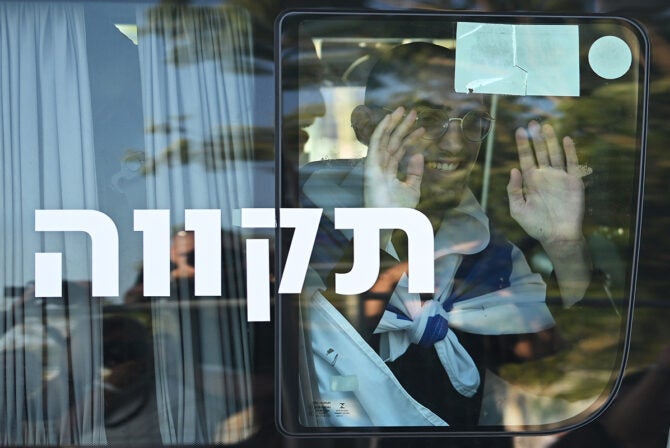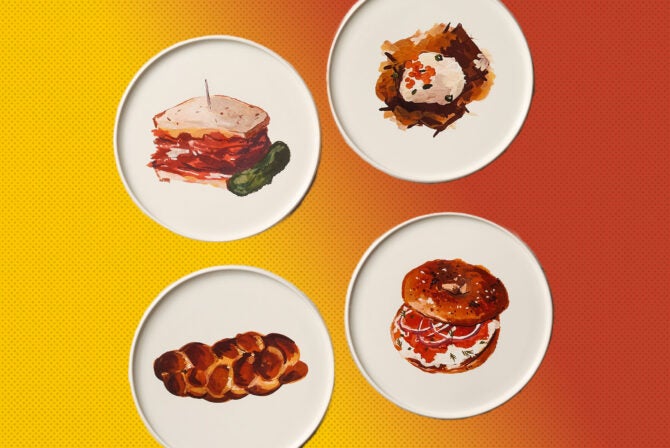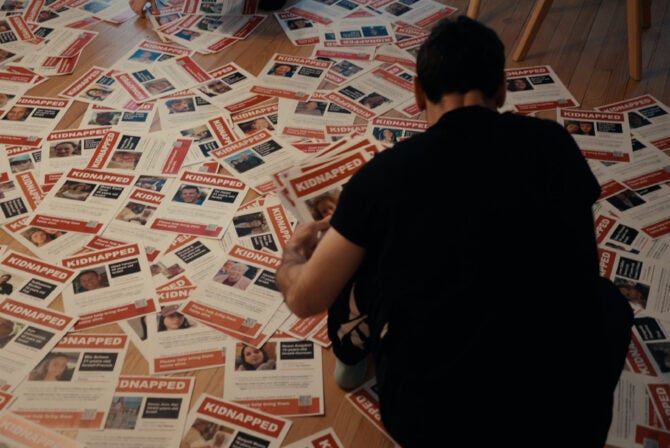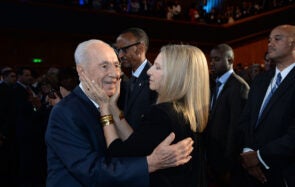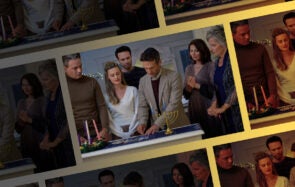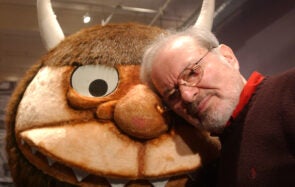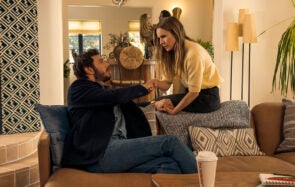We met 30 years ago at the University of Michigan as freshman—two young women from different parts of the country, but with similar enough families, worlds, and lifestyles that it was as if we had grown up on the same block. We had a friend in common, but soon gravitated to each other when we mutually came up with the idea of finding a Friday night service to attend.
We knew that when you come to a “foreign” place (in our case, college), it’s important to find your grounding—and a synagogue seemed to fit that bill. The fact that we knew there would be wine and cute boys only influenced our decision slightly.
The night didn’t exactly work out as planned. En route to the temple, we found an all-night sale at a clothing shop, which we couldn’t pass up, and that was followed by dinner, drinks, and more shopping. The synagogue was all but a distant memory at that point. But despite our failed attempt at celebrating Shabbat together, we found that being Jewish and identifying as such would play a significant role throughout those college years.
Somewhat bizarrely, we moved into an exclusive women’s dormitory, which seemed almost designed to provide the perfect Christian experience. The building, replete with its Venus de Milo statue, formal gold drapery and grand piano, was a throwback to the culture of when it was established in 1915. There was grace before dinner, which was served on fine china. There was Christmas caroling at 6 a.m. followed by a big Christmas breakfast in the week prior to winter break.
There were even dorm-wide Easter egg hunts. And every Sunday morning, large collections of young women would head out to church together. We would sleep through the church gathering, but avail ourselves of the brunch after, often musing on how different we felt from many of our cohabitants. And, we were different—we were not traditional, and we were not Christian.
When not considering our otherness in the dormitory, we immersed ourselves in activism. We proudly championed the cause of the Sandinistas and stood firmly against Oliver North and Justice Rehnquist. We marched on Washington for women’s reproductive rights and performed guerrilla theater against nuclear proliferation. But, as always, we returned to our status as “other” because of our religion. We made a point of seeking out Hillel and High Holiday Services—and, on most occasions, we weren’t detoured and actually made it. Again, at some deep level, one element that tied us together was being Jewish.
In our residence hall, that became our cause. We felt obligated to show how the other half lives (or rather how the Jewish 2% of the population live). We formed the Interfaith Committee and managed to get the dorm to cough up some cash for Jewish celebrations. We made hamantaschen and latkes and insisted they be served, just as the ham was served for Easter dinner. An electric menorah was procured. Although it paled next to the glorious Christmas tree, we still felt triumphant.
It was on a wintry afternoon, as we were switching on the fourth light bulb on the menorah to signify a new day of Hanukkah, that we were approached by the head of the dormitory—an Irish Catholic, stout woman in her early 60s. She told us she was impressed with our dedication to our religion, and that one day, it would be our obligation to pass on our traditions to our children—she said it wasn’t about god, it was about ritual, community and connection.
Naturally, we weren’t terribly surprised at her bringing up our having children. The dorm’s weekly afternoon teas, where the women dressed up and male students were trotted through as potential suitors, made other students snicker that we were getting our MRS degrees. But, her statement minimizing God in favor of tradition was wholly unexpected, and it resonated. It did help us feel that we belonged—even if the God of our religion was different than that of the other residents.
Years went by. We went to graduate schools, got married, and yes, finally brought into the world those children that the dorm matriarch had anticipated. And once again, we found that we had to assert ourselves regarding how we wanted to define being Jewish—but this time it was within the context of our own marriages. One of us had married a non-Jew, and one had married a Jew who had the typical awful Hebrew school experience growing up, and found religion ultimately exclusionary.
We were both perplexed about how to navigate this new terrain where we lacked a common language around religion with our partners. As our children were getting older, we would call each other, and doing our best impression of our Irish Catholic mentor, would resolutely state “You have an obligation to pass on your traditions to your children! It’s about ritual, community, and connection!” The problem was that we didn’t know how to do that successfully, how to find the kind of community that didn’t alienate our husbands, but wasn’t so far afield from our own upbringings that we were compromising our own values.
It was around the time that our eldest children had both turned 8 that we realized that we had each found that community. The oddest part was that even though one of us lives in Washington DC and the other in New York, we both identified and enrolled our kids in nearly identical Jewish educational programs that focused not on religion or prayer, but on culture, identity, and community. While one program teaches Yiddish and the other doesn’t believe in God, both have a core commitment to teaching social justice—a thread that had been deeply woven in us from years ago.
Since then our second-born kids have also joined these programs. Our community Passover seders identify oppression around the world and serve as an opportunity to collect money for those causes. Sukkot is celebrated as a holiday to care for the earth and involves going to clean up city parks.
We initially signed up for “Jewish School” for our kids’ sake, but unexpectedly have stumbled upon a path into Judaism that reflects who we are as well. As Benjamin Franklin said, “Out of adversity comes opportunity.” For us it has been a real evolution from the days of the electric menorah; it is ritual, community, and connection.
Read More:
Facing Anxiety as a Mother, Wife & Woman
I Worried About My Son’s Daycare…For the Wrong Reason
I Thought I Was Just an Anxious Jewish Mom, Until I Started Anti-Depressants
